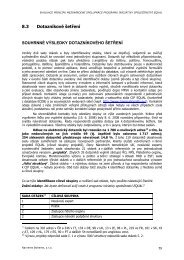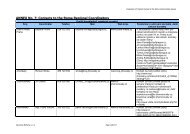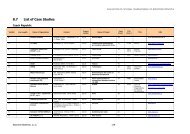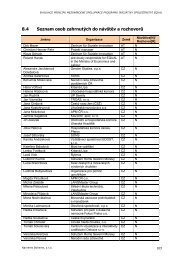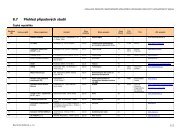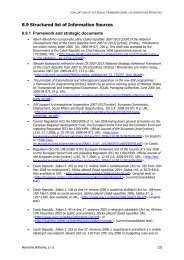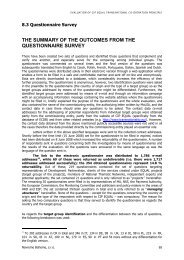EQUAL - Final report - eng - navreme
EQUAL - Final report - eng - navreme
EQUAL - Final report - eng - navreme
You also want an ePaper? Increase the reach of your titles
YUMPU automatically turns print PDFs into web optimized ePapers that Google loves.
7.1.5 Monitoring and evaluation<br />
EVALUATION OF CIP <strong>EQUAL</strong> TRANSNATIONAL CO-OPERATION PRINCIPLE<br />
• To define the own indicators of measurement of progress and success;<br />
• To incorporate monitoring and evaluation activities in the plan, time schedule and budget of the<br />
project;<br />
• Not to be afraid to acknowledge a mistake, to have instruments for correction, modification, to<br />
incorporate the results of the evaluations in the project cycle management;<br />
• To make use of evaluation and monitoring for improvement of the management of the project<br />
quality and its results;<br />
• On the basis of ongoing evaluation, to carry out programme corrections that will increase its<br />
effectiveness.<br />
7.2 Recommendations for MA and NSS<br />
7.2.1 Role within the framework of the programme and relations to other<br />
actors<br />
• The rules of management, implementation and the formulation of the calls itself and of all the<br />
other supporting documents should be understandable, consistent and they should not change in<br />
course of the proceeding, as the case may be modifications are recommended only in cases where<br />
they do not complicate the programme implementation and implementation of the projects<br />
themselves.<br />
• With regard to the fact that from the essence of the transnational cooperation contact<br />
with partners from other countries results, the programme management should, to the maximum<br />
possible extent, harmonise the rules so that these might not collide directly with the rules in other<br />
countries, this relates above all to eligibility of expenses and conditions of partnership (partnership<br />
agreements).<br />
• It would be convenient to facilitate the process of concluding partnership agreements and further,<br />
to create conditions for contingent modifications of contractual relations among the partners.<br />
• The role of the managing authority, as the case may be of other supporting bodies must be<br />
defined clearly and presented to the aid recipients; it should be always obvious, to whom, when<br />
and with what the entities interested in information may turn in a certain stage of the project<br />
implementation (from the preparation of the partnership as far as to the closure of the projects<br />
and further utilisation of their outputs).<br />
• The programme management should create multi-channel communication for the recipients’<br />
groups, the used communication tools should be understandable, the forms should be acceptable,<br />
and communication should correspond to needs and possibilities of the given groups.<br />
• It is necessary to keep always in mind the main programme’s objectives, and thus to search for<br />
the ways how to improve the quality of the projects and to decrease the administrative burden of<br />
the entities implementing them, to eliminate instrumental and purposeful projects and misuse of<br />
the aid; for this purpose it is possible to consider e.g. simplification in <strong>report</strong>ing, introducing lump<br />
expenses, making the monitoring system more transparent and drawing up the so called black<br />
lists.<br />
7.2.2 Formulation of expected outputs and results of the transnational<br />
cooperation<br />
• The calls should be announced in the manner that would provide sufficient time not only for the<br />
drawing up of projects, but also for the evaluation of a call as such (from this reason, the version<br />
of announcement of more calls gradually and differently oriented/modified seems as more<br />
convenient).<br />
Navreme Boheme, s.r.o. 49



